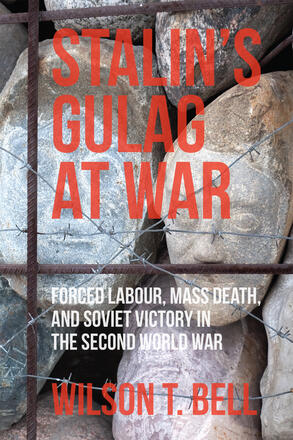
Stalin's Gulag at War
Forced Labour, Mass Death, and Soviet Victory in the Second World War
La description
Stalin’s Gulag at War places the Gulag within the story of the regional wartime mobilization of Western Siberia during the Second World War. Wilson T. Bell explores a diverse array of issues, including mass death, informal practices such as black markets, and the responses of prisoners and personnel to the war. To learn more about this publisher, click here: http://bit. ly/2C3QxA6
Reviews
"As a careful empirical researcher, Bell eschews a single overarching argument, pointing repeatedly to paradoxes and contradictions in administrative intention and ground-level reality. While he insists on the primacy of economic motivations in running individual Gulag outposts, he reveals Gulag labor as costly and inefficient compared to alternative approaches to economic output. While he highlights the contribution that Gulag labor made to Soviet victory, he reminds us that those contributions were a tiny part of the total mobilization of the Soviet workforce outside the Gulag during the war. "
- Steven A. Barnes, George Mason University
"Although Bell touches on and evaluates various theories and arguments, his book is a close, source-based archival study of what happened in practice, on the ground. [This] is a good example of careful empirical research. He went where his sources took him and lets readers make up their own minds rather than prosecuting an a priori theoretical case. "
- J. Arch Getty
"Wilson Bell’s excellent book, Stalin’s Gulag at War, is a detailed and dispassionate contribution to this growing body of research. Drawing on in-depth archival research and focused on camp operations and everyday camp life in Western Siberia during World War II, Bell reveals the extent to which the imperatives of Stalinist wartime mobilization molded the camps in these crucial years."
- Peter Whitewood, York St. John University
"...an excellently researched and thought-provoking study which will no doubt influence the direction of future research."
- Mark Vincent
"Suffice it to say that our understanding of Gulag operations during World War II is significantly deeper thanks to Bell’s scrupulous attention to the intricacies of parsing documents from the People’s Commissariat for Internal Affairs, coupled with a close reading of memoir literature and supported by previous Gulag scholarship. Scholars, students, and World War II buffs will benefit from this engaging volume."
- Cynthia A. Ruder, University of Kentucky
"Bell has synthesized a huge amount of material to create a lasting contribution to the field, but this is a book that should also be read by historians beyond the Soviet field: environmental historians, historians of penal systems, or those of colonization too can find much to learn from Stalin’s Gulag at War."
- Victor Petrov, University of Tennessee Knoxville